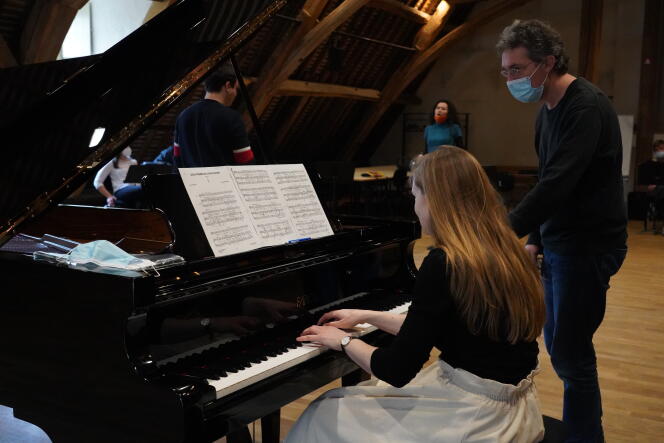
“Wake up, wake up, cute partridge!” “ The trumpeting call for love that opens the Song of the bride, first of five Greek folk melodies composed by Ravel between 1904 and 1906, immediately puts in tension the acute range of mezzo-soprano Grace Durham. At 32, the Briton and her pianist, Edward Liddall, are part of the four duets selected by the Académie Orsay-Royaumont for a study session devoted to French melody, which takes place from 1is to February 7 under the leadership of mezzo Stéphanie d’Oustrac and pianist Pascal Jourdan. “See the gold ribbon I’m bringing you, to tie it around your hair”, continues the ravelian chant. We left the public sphere for the realm of intimacy, sensual, erotic. “Put the music in your legs”, launches Stéphanie d’Oustrac. If he offers her a ribbon, it is the better to untie it! “ Musicians have their jargon, the signifier of which sometimes escapes laymen. For his part, Pascal Jourdan asked the pianist “A jamming of pedals in order to put more light in the accompaniment. “
François Naulot, artistic director of the voice and scenic unit program: “The need to meet and revitalize in a place like Royaumont has never been so strong”
Regular guests of the Royaumont Foundation, whom they frequented as interpreters, the two partners are teaching together for the first time. Stéphanie d’Oustrac and Pascal Jourdan met in the mid-1990s at the National Conservatory of Lyon. Together, they built this organic entity that mocks the supposed hierarchy between singer and accompanist, and transcends in an exceptional understanding The summer nights by Berlioz or The human voice by Poulenc, as well as the entire French repertoire, as evidenced by their album An invitation to travel, anthology of Debussy, Hahn, and Duparc, published in 2014 by Ambronay Editions.
The lunch break separated the pairs, each their table. A social distancing enveloped by the sonorous voice of bass-baritone Mikhail Timoshenko, alternating big laughs, French and English. The Russian, who made his debut at the Paris Opera, where he studied at the Académie lyrique, is no longer a stranger to the general public since his appearance in Jean-Stéphane Bron’s film, Opera (2017). It is he who sticks to it at the beginning of this contemplative afternoon in the idle and voluptuous solitude ofHotel, one of five poems by Guillaume Apollinaire that Poulenc set to music in a 1940 collection entitled Banalities – a text that inspired the hit song (and in French) by the American group Pink Martini, I do not want to work. ” I want to smoke “, breath on his side Timoshenko. Stéphanie d’Oustrac mimics on the “m” the exhalation of a long puff that the singer takes on his own, this time accompanying the note until his death in volute. Magnificent. The singer loves French melody, a genre he has been practicing for six years in the company of the talented Elitsa Desseva, skimming with her a number of international competitions, from Graz to London, via Stuttgart, Dortmund and Lyon.
You have 64.27% of this article left to read. The rest is for subscribers only.
–


![[전국]Traveling to the regret of not being able to go home… [전국]Traveling to the regret of not being able to go home…](https://image.ytn.co.kr/general/jpg/2021/0212/202102121550445108_t.jpg)